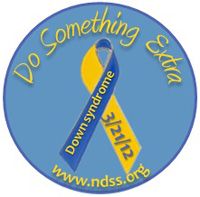 |
| From a wonderful site: Kidz |
When I was pregnant with my first son I was given the option of prenatal testing. It was not something I had ever thought about before. I didn't know what to do. The doctor I saw that day told me that he looked at prenatal testing, not as "termination testing" (ie: to determine whether or not to terminate a pregnancy), but as a means to prepare for the duration of the pregnancy. He told me that it was just an additional method of collecting information for how to treat both the mother and the baby through the pregnancy. This was a viewpoint I had not ever considered before, but I appreciated it. The older I get, the more important it is to me to think outside of my comfort zone. To think outside the box.
The reason I raise this subject is because of a new blood test that was released today by Sequenom. This blood test will allow parents to test whether or not their baby has Down syndrome much earlier in the pregnancy. According to the article in Business Week, parents will be able to find out as early as 10 weeks into a pregnancy whether or not a baby has Down syndrome. Here is where my problems begin. Is this a test to provide more information? To provide better prenatal care? Is this a test to help prepare parents for having a child with Down syndrome. Or, is this a test to help people terminate their pregnancies that much earlier. Can you imagine if you had a child who had childhood leukemia and then you found out that scientists had created a prenatal test to determine whether or not your child would have leukemia. What would the purpose of that test be? To terminate so that you don't have to deal with the stress or burden of having a sick child. What if there was a test that determined prenatally whether or not your child would be intelligent? Where does this road go?
What disturbs me the most is that a diagnosis of Down syndrome is compatible with life. With living. It is not a death sentence. I pray and I hope that this blog and others that are out there are truly shedding light where there is darkness and are showing the world that having Down syndrome or having a child with Down syndrome is hardly the worst thing in the world.
Eugenics?
Sequenom to Sell Down Syndrome Test 2 Years After Pullback
October 17, 2011, 5:02 PM EDT(Updates with comments from ethicist in third paragraph.)
By Ryan Flinn
Oct. 17 (Bloomberg) -- Sequenom Inc. said its prenatal test for Down syndrome will be available in 20 U.S. cities today, two years after an earlier effort was delayed because employees mishandled research data.
The blood test is accurate in detecting Trisomy 21, the genetic chromosomal abnormality that most commonly causes Down syndrome, 99.1 percent of the time as early as 10 weeks into a pregnancy, the San Diego-based company said in a statement. The test, and others that will be able to identify genetic abnormalities early in pregnancies, will alter the debate over abortion, said Art Caplan, director of the center for bioethics at the University of Pennsylvania.
“For many people this test makes it morally, emotionally and psychologically easier to have an abortion,” Caplan said in an interview.
Caplan said future prenatal tests may be able to indicate if the fetus had biomarkers for Alzheimer’s disease, or breast cancer, or other diseases. Those tests will raise questions about what issues will trigger potential parents to choose an abortion. A survey published last month in the American Journal of Medical Genetics showed that only 4 percent of parents with Down Syndrome children regretted having them.
Ethical Shift
“Ethically, we are now starting to see the shift in the issue of what counts as a medical disorder, what’s significant enough to test for, what’s a genetic disability or just a difference,” he said. “Many in the Down syndrome community would say it’s just a difference.”
Sequenom funded a study, carried out by independent researchers, that confirmed the results of its test. The study will be published in the journal Genetics in Medicine.
“This is the first time that a large independent study like this was done in a blinded fashion, and it’s analyzed independently by the principal investigators,” Dirk van den Boom, Sequenom’s senior vice president of research and development, said in a telephone interview. “I think this is a true validation of the technology that should convince people that this works, very accurately.”
In April 2009, the company said it was delaying the release of its Down syndrome test after discovering employees mishandled research data, and shares plunged 76 percent. More than a year later, Elizabeth A. Dragon, former senior vice president of research and development at Sequenom, pleaded guilty to conspiracy to commit securities fraud for lying to investors about the effectiveness of the test.
Test Procedure
Sequenom’s genetic test uses a blood sample from a woman who is pregnant. The most common current test for Down syndrome inserts a needle into the pregnant woman’s uterus to withdraw amniotic fluid. The needle technique, known as amniocentesis, carries a risk of miscarriage.
This new test, if administered to women at high risk for having a Down syndrome child, can “reduce procedure-related losses by up to 96 percent, while maintaining high detection,” according to the Genetics study.
The company said the test is aimed at the estimated 750,000 pregnancies at high risk for Down syndrome annually in the U.S.
Sequenom’s announcement is a good step toward giving pregnant mothers more accurate information earlier, said Matthew Rabinowitz, chief executive officer of Gene Security Network in Redwood City, California, which is also developing a noninvasive test for Down syndrome.
‘Better’ Earlier
“If a couple finds an abnormality, and chooses to terminate the pregnancy, it’s better to do it earlier,” Rabinowitz said in a telephone interview. A family member of Rabinowitz’s was given a false-negative result during her pregnancy, and gave birth to a child with a genetic disorder, who died shortly after, he said.
“The current state of noninvasive testing is not suitable for this century,” Rabinowitz said.
Down syndrome is characterized by slower mental and physical development, including delayed language and motor skills, according to the National Institutes of Health. Those with the condition are put at greater risk of ailments such as heart and thyroid disease.
Sequenom’s shares increased 4.5 percent to $5.56 at 4 p.m. New York time, the biggest gain among 125 companies in the Nasdaq Biotechnology Index.
--Editors: Andrew Pollack, Angela Zimm
To contact the reporter on this story: Ryan Flinn in San Francisco at rflinn@bloomberg.net
To contact the editor responsible for this story: Reg Gale at rgale5@bloomberg.net
Education
Fortunately, for parents who are pregnant with a baby who has Down syndrome, there is an incredible organization that was just taking off when I was pregnant with Joey. It is called Down Syndrome Pregnancy and they provide resources, education and incredible support.

They have come out with the following response to the new prenatal testing and it is such a wonderful and well-thought out response. For our family, a CVS test when I was 13 weeks pregnant was strongly encouraged because of Joey's cyctic hygroma. Our doctors wanted to know what we needed to do to treat him. For us, it was a blessing to receive his diagnosis ahead of time. For me, I am grateful because I was able to be excited, I was able to be prepared and I was able to celebrate his miracle birth.
New Prenatal Testing: Are You Ready?
We at DownSyndromePregnancy.org challenge you to make a personal action plan so that the day the new test will launch expectant parents across the nation will have the support and information they need to truly understand Down syndrome.
Step 1: Educate yourself.
Learn about the tests. There are a variety of companies developing new tests, and it is our understanding that Sequenom is at the forefront. The goal is to avoid invasive testing and check the mother’s blood for fetal DNA that will indicate Down syndrome, but the technology is complicated. You can find a thorough explanation of prenatal testing technologies and bioethics hosted by the Down Syndrome Guild of Greater Kansas City here.
Learn why our expectant parents will appreciate tests. Many of our expectant parents struggle with the decision to do invasive testing due to the small risk of miscarriage. Yet, testing can offer many benefits to a baby with Down syndrome, and to the expectant parents. Many of us took the risk of invasive testing in order to obtain those benefits. They include:
- settling an anxiety-causing question
- better prenatal care, such as a fetal echocardiogram
- time to adjust and grieve now, so that parents are happy and adjusted when the baby is born
- time to learn about Down syndrome and seek out a support structure
- possibly rethinking birthing plan & place of delivery, such as delivering at a hospital with a NICU
- preparing friends and family
- having a better newborn experience than if the baby is diagnosed at birth (Dr. Skotko’s research)
- planning for child-care and breastfeeding with Down syndrome in mind
- checking on quality of health insurance and switching if necessary
- learning about local resources, including the children’s hospital, the local Down syndrome group, and the local Down syndrome clinic
Learn about resources for health care professionals. There are several resources available to health care professionals addressing the way in which to deliver a diagnosis. Familiarize yourself with these materials and inform your health care providers and local groups.
- Lettercase.org offers a bi-fold brochure for medical providers that gives a synopsis of research and studies about how best to deliver a prenatal diagnosis. The brochure offers references for resources specifically for medical professionals.
- Drs. Skotko, Kishnani, and Capone have written an article in the American Journal of Medical Genetics advising medical professionals how best to deliver a Down syndrome diagnosis. You can access this article from Dr. Skotko’s website.
- Brighter Tomorrows offers a virtual interactive tutorial for medical care providers on how to deliver a diagnosis, featuring various scenarios. There is also a refresher version for those who revisit the site.
- The National Down Syndrome Congress (NDSC) has a physician’s guide to delivering a diagnosis of Down syndrome.
- Your local Down syndrome organization may also have a medical outreach program, present at “grand rounds” at local hospitals, or host guest speakers to address medical care providers. Become familiar with the services your local group provides, or the successes of other local groups.
Learn about resources for expectant parents. There are resources out there specifically for expectant parents which will inform and support them.
- Lettercase diagnosis booklet “Understanding a Down Syndrome Diagnosis” has been revised with feedback from representatives of the National Society of Genetic Counselors, the American College of Medical Genetics, the American Congress of Obstetricians and Gynecologists, the National Down Syndrome Society, and the National Down Syndrome Congress. This booklet has been selected as the national gold standard by the Kennedy Foundation First Call committee and should be given to expectant parents learning of a diagnosis. This is a diagnosis booklet – the first tier of support to all parents receiving a prenatal diagnosis. (English and Spanish)
- DownSyndromePregnancy.org provides support to expectant parents preparing for the birth of a baby with Down syndrome. Our book Diagnosis to Delivery: A Pregnant Mother’s Guide to Down Syndrome is downloadable. We have a blog, host a discussion board on Baby Center, host group support phone calls, and provide support via private messages and e-mails. Our goal is to provide well-researched, practical information, daily support, and reflections on specific topics from experienced parents. This is a set of pregnancy resources – the second tier of support for parents moving forward after a prenatal diagnosis.
- Brighter Tomorrows provides a variety of informational materials to expectant parents, available on-line as free downloadable documents. (English and Spanish)
- The National Down Syndrome Adoption Network (NDSAN) provides information to birth families who may be seeking alternatives to parenting as they prepare for the arrival of their child. Adoptive families are located all across the United States and Canada. To contact Coordinator Robin Steele please call 888-796-5504 or email her at rsteele@zoomtown.com.
- Gifts: Mothers Reflect on How Children with Down Syndrome Enrich Our Lives. Edited by Kathryn Lynard Soper, this collection of personal stories is a source of validation and inspiration to parents facing a new diagnosis. Honest and beautiful, many stories focus on prenatal diagnosis.
- “What Parents Wish They’d Known: Reflections on Parenting a Child with Down Syndrome” (free downloadable booklet edited by Kathryn Lynard Soper available from Woodbine House)
- Your local group may also have a prenatal outreach program designed to provide support to expectant parents.
Read the resources. Read them thoroughly, understand the differences between them. Put the websites on your “favorites” and add them to the resource list on your websites and blogs. When people are looking for information, you should be able to easily guide them to these resources and accurately explain the purpose and audience of each resource.
Attend webinars and lectures. Many organizations, such as NDSS and Down Syndrome Affiliates in Action, host webinars or in-person presentations by informed community leaders which will help you understand the issues involved with prenatal diagnosis. There are also radio interviews now and then. Some are available as podcasts:
Nancy Iannone, Executive Director, Down Syndrome Pregnancy,podcast
Dr. Brian Skotko, M.D., M.P.P., clinical fellow genetics, Children’s Hospital Boston, podcast
Learn about what is facing expectant parents. Beyond the “issue” of prenatal diagnosis, learn about the challenges that expectant parents face which are specific to pregnancy. What worries do they have? What information do they need? What kind of support do they need? You can learn this by reading our pregnancy book and our expectant parent’s questions on the discussion board (link listed onDownSyndromePregnancy.org).
Step 2: Donate.
Yes, donate. A little goes a long way when people join forces. DownSyndromePregnancy.org has many projects planned which need funding, like booklets for friends and family. In addition, Lettercase plans on being a presence at national or regional medical conventions, engaging in important ongoing dialogue with the medical community, and arranging nationwide distributions of booklets. Further, NDSS funded the initial distribution of the Lettercase booklets to the medical community. All of these organizations — and your local group — are in need of funding to further the goal of informing and supporting expectant parents. They need the investment of the community in this important work.
Step 3: Check your vocabulary.
We know discussions of prenatal testing and the ultimate statistical result can touch a very raw nerve. We understand and appreciate the passion of our community, the need to advocate and educate, and sometimes the sadness that results when a community member looks at statistics. As you talk and write about the new testing, please try to think about how you channel your passions. Will words that make you feel better cause such negative reactions that ultimately you will do more harm than good?
Don’t waste time trying to stop the train. The testing is coming, and expectant parents worried about the health of a baby will take the test. If your efforts lie in fighting against the testing, or convincing people not to test, most of your efforts will be wasted. Expectant parents have their own motivations for seeking answers, and they will not be deterred in the numbers that will make your efforts yield a large-scale change of direction. In addition, you will be perceived as “anti-information” and any discussions you have afterwards about Down syndrome will be viewed with more skepticism: you will damage your credibility.
Speak positively about resources available for expectant parents. Any discussion about testing – whether it is a casual discussion with a friend or an interview with a major network – should turn to a discussion of the resources available to expectant parents and physicians. Entities like Lettercase and DownSyndromePregnancy.org should be automatic discussion points. Awareness of the credible resources out there is key to reducing the aspect of information deficiencies that can leave expectant parents floundering after a diagnosis.
Speak respectfully of parents embarking on testing. Questioning the motivations of expectant parents who test for Down syndrome and discussing such parents negatively is, of course, inappropriate. But sometimes community members do so as they share in cyber space or with reporters. Doing this displays a lack of understanding of the complexities involved in seeking information about one’s baby, and again will identify a community member as one whose information or insight is not credible to expectant parents. Often community members make comments that they do not even realize may sound “off” to someone else. (For example, “I never found out when I was pregnant, because I loved the baby regardless.” What does that statement imply about those who found out?)
Speak respectfully of parents facing choices. Sometimes community members will characterize the motivations of those who face decisions, or who have made decisions different than ours, in ways that lump together all of these people in a negative way. Often this takes the form of characterizing all of those people as seeking “the perfect child” or similar characterizations. These beliefs have at their heart the genuine and valid ethical concerns so many parents share about how people with Down syndrome are or have been viewed or treated historically by society. However, when these valid concerns join with the classic and on-going debate in our country over choices, the discussion can turn the corner from clear ethical discussion to hot-headed debate. The discussion can quickly spiral out of control, and leaves expectant parents facing decisions feeling judged, confused, attacked, and more anxious and fearful that they were before. Again, consider the benefit of you “having your say” against the detriment of alienating your audience.
Speak respectfully of the medical community. Please do not allow stories (or your own personal experience) of a negative interaction with a medical care provider in the prenatal context to drive your discussions about the medical community. We know there have been issues. We know the research on the way a diagnosis is presented, and many have experienced a lack of appropriate information. But a solid, respectful, and appreciative relationship with the medical community is key to its enthusiastic support of providing expectant parents with a Down syndrome diagnosis appropriate information and supports. With the Lettercase diagnosis booklets and the DownSyndromePregnancy.org pregnancy materials, medical providers now have appropriate materials that do not depend on whether a locale has a Down syndrome group with a prenatal program. They have the tools which did not exist previously.
Step 4: Participate.
National level. Sign up for mailings from the national organizations (NDSS and NDSC). When the national groups ask for your assistance in contacting lawmakers, make the time to help. Place yourself on the mailing list of Lettercase.org. Provide advice to expectant parents at DownSyndromePregnancy.org, but remember the guidelines discussed above about speaking respectfully.
Local level. Offer your volunteer services to your local Down syndrome group’s prenatal support program.
Step 5: Share with your doctor
Write a letter about resources. Providing a list and contact information for the medical resources outlined above would be very useful for your doctor and likely save him or her a lot of time.
Drop off resources. Order diagnosis booklets from Lettercase and deliver them to your doctor, or assist your local group in doing so. The printed version of Diagnosis to Delivery should be available soon as well for you to give to your doctor. Explain to your doctor that the diagnosis booklets are the first tier resource for patients receiving the news, and that Diagnosis to Delivery is for patients continuing a pregnancy.
Step 6: Educate your loved ones and community.
A fully informed community member is better able to have informed and enlightening conversations with friends and family, and local news reporters. A fully informed blogger is able to write blog posts that are as enlightening as they are useful.
To access the hyperlinks in this document, visit DownSyndromePregnancy.org and click on “Resources.” To obtain a .pdf of this document to forward, e-mail Nancy McCrea Iannone atNancy@DownSyndromePregnancy.org and ask for the .pdf of the Action Plan.
Please spread the word and encourage people to consider the new testing available as a means to become better educated and prepared instead of a means of performing eugenics on people who happen to have an extra chromosome.
Please help shed light where there is darkness and educate others about Down syndrome.
Please help insure that babies like Joey will continue to have a place among all of us.
































No comments:
Post a Comment
Thank you for your comment! We read every comment!